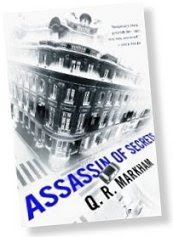That might be a bit too cynical of a thing to say about Parnassus Books, the little independent bookstore author Ann Patchett (The Patron Saint of Liars (1992), Bel Canto (2001), State of Wonder (2011)) opened with Karen Hayes, a publishing veteran who made her bones at the Ingram Book Company and Random House.
It seems that when a much-loved indie bookstore went belly-up in Nashville, Tennessee, the townspeople panicked.
"People were greeting each other in grocery stores, at holiday parties, wringing our hands," said Beth Alexander, president of the board at the Nashville Public Library Foundation. "We’re home to two dozen universities. We need to have a bookstore other than a campus bookstore, and people were looking at each other and saying, 'We're very concerned about this.'"
Seldom would the closure of a bookstore ever generate such a shockwave here in Malaysia. But Nashville, said to be the "Athens" of southern US, is home to Vanderbilt University which is ranked 51st by The Times Higher Education World University Rankings 2010-11. Notable people who went there include author James Patterson; Charlie Soong, dad to the Soong sisters; Grameen Bank founder Muhammad Yunus; and artiste Amy Grant.
Named for the fabled mountain that is considered the home of poetry, music and learning in literature, it is hoped that Parnassus Books would fill the void left behind by the closing of small-time bookstores in Nashville.
"I have no interest in retail; I have no interest in opening a bookstore," said Patchett about the venture. "But I also have no interest in living in a city without a bookstore."
Same here.
Getting personal
In another piece, also on the NY Times, the author of State of Wonder opines on the evolution of the bookstore. "The cycle has come all the way back around: the little bookstore grew into a big bookstore, which was squashed by the superstore, which folded beneath the Internet store, which made people long for a little bookstore." A process, she says, that took just 13 years.
Now, in the (dying) era of the book emporium chain, parts of the US appear to be embracing the indie bookstore again, competing - says the New York Times - "where Amazon cannot: by being small and sleek, with personal service, intimate author events and a carefully chosen rotation of books. ...Make your store comforting and inclusive, smart but not snobby." Parnassus also has a coffee bar.
Admittedly, I don't know any that would fit. Mention "indie bookstore" to (some) Malaysians and they'll say, "Silverfish"; an even more select few would suggest Skoob Books. Both are cosy little nooks. I remember the buzz from the sight of rows of volumes by big literary names. You want to read there, and if you had a pen and notebook, you'd want to write there, too. Author events and readings feel more natural at a bookstore.
If there's some extra space, why not host another independent industry? Ice cream? Baked goods? Personal hygiene products? The networking possibilities, the tie-ups! Fancy a small cup of Last Polka durian ice cream at a discount when you buy a copy of Amir Muhammad's The Big Durian? Weekend bazaars are okay, but I'd rather not wait for the next Art For Grabs for a bar of handmade mint and cucumber glycerine soap (ahh) from The Bubble Lab.
Some might argue that the select number of titles and the presence of the owners might ramp up the snob levels a few, but that's a minor kink. Indy establishments must have character. A coffee bar wouldn't hurt, though.
Missing things
As the physical book retreats to its place as a luxury item, the approach to selling one should match: personalised service, limited range, and a staff who knows what they're selling (Amazon recommendations are nice, but they sound cold and can be inaccurate). Increased human contact also builds trust, something that's been eroded by the convenience of long-distance digital communication.
Yes, there's always the cost factor. Independents can't survive the long run without a supportive community. Reading about Parnassus and Nashville makes me wonder about the (lack of a) sense of community here, which seems more conducive for our savage brand of politics, rather than communal ties.
But the indy label's not just about out-of-the-box. It also encompasses identity and self-expression. And if the products and services are consistently good, and if the owners are proud of what they do, indy also means quality.
Quality, trust, and the human touch. They've been missing from our lives for so long, but I bet we'd still recognise them when we see them.
Categories:
Book Blab







